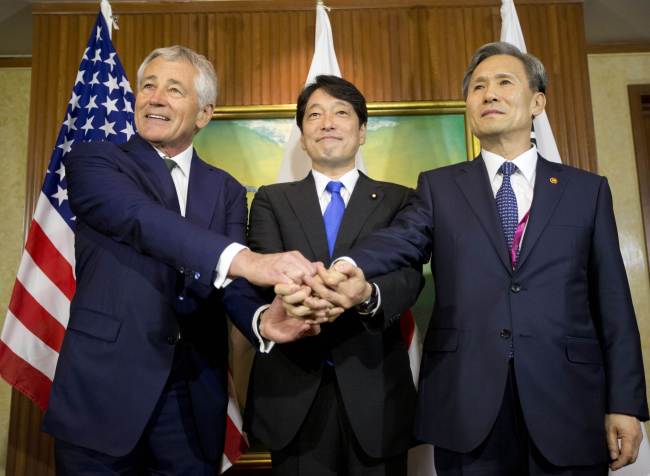S. Korea, U.S., Japan push for intelligence-sharing pact
By Shin Hyon-heePublished : June 1, 2014 - 20:46
The defense chiefs of South Korea, the U.S. and Japan on Saturday agreed to shape up their pursuit of an agreement on sharing military intelligence to better deal with North Korea’s provocations.
During the trilateral talks in Singapore, Kim Kwan-jin, Chuck Hagel and Itsunori Onodera “reaffirmed the importance of sharing intelligence about North Korea’s nuclear and missile threats,” they said in a joint statement.
“We shared the view that a continued review of the issue is necessary,” it said, indicating that the three sides will push for the signing of a related trilateral memorandum of understanding.
“Based upon the shared value and security interests, the three ministers will proceed with trilateral security cooperation and vowed to expand cooperation to contribute to the peace and stability of the Asia-Pacific region and the world,” they noted.
During the trilateral talks in Singapore, Kim Kwan-jin, Chuck Hagel and Itsunori Onodera “reaffirmed the importance of sharing intelligence about North Korea’s nuclear and missile threats,” they said in a joint statement.
“We shared the view that a continued review of the issue is necessary,” it said, indicating that the three sides will push for the signing of a related trilateral memorandum of understanding.
“Based upon the shared value and security interests, the three ministers will proceed with trilateral security cooperation and vowed to expand cooperation to contribute to the peace and stability of the Asia-Pacific region and the world,” they noted.

The meeting took place on the sidelines of the 13th Asia Security Summit, also known as the Shangri-La Dialogue, and marked the first venue for the three countries to officially work on the intelligence sharing issue.
Washington, which has a bilateral military intelligence pact respectively with Seoul and Tokyo, has been pushing for a trilateral cooperative mechanism, but the efforts have been hampered by sour relations between the neighbors.
The two countries had come close to signing a pact on boosting exchanges of military intelligence on North Korea in 2012, but Seoul dropped the plan due to a wave of public opposition. Many South Koreans still resent Japan for its rule over the Korean Peninsula from 1910-1945, with the right-wing Shinzo Abe administration’s continued attempts to whitewash the wartime atrocities worsening the situation.
“The trilateral MOU will be confined to the intelligence on North Korea’s nuclear and missile programs,” a Seoul ministry official stressed.
At separate bilateral talks there, South Korea and the U.S. agreed to set the timing of and conditions for the transfer of wartime control of South Korean troops from Washington to Seoul by October, officials here said.
Kim and Hagel agreed upon the work plan that specifies the timetable to decide when and under what conditions the South will regain the wartime operational control of its troops from Washington.
“By October when the allies are scheduled to hold their annual Security Consultative Meeting in Washington, the two sides will have set the appropriate timing and conditions for the OPCON transfer,” a defense ministry official said, requesting anonymity.
South Korea handed over control of its forces to the U.S. during the 1950-53 Korean War to defend against invading troops from North Korea. Peacetime control of its forces was returned in 1994, and South Korea is scheduled to receive wartime control in December 2015.
But last year, Seoul asked for a delay after the communist country conducted its third nuclear test, and South Korean President Park Geun-hye and U.S. President Barack Obama agreed in April to reconsider the timing of the OPCON transfer amid Pyongyang’s threat to carry out yet another nuclear test.
From news reports




![[Herald Interview] 'Amid aging population, Korea to invite more young professionals from overseas'](http://res.heraldm.com/phpwas/restmb_idxmake.php?idx=644&simg=/content/image/2024/04/24/20240424050844_0.jpg&u=20240424200058)











![[KH Explains] Korean shipbuilding stocks rally: Real growth or bubble?](http://res.heraldm.com/phpwas/restmb_idxmake.php?idx=652&simg=/content/image/2024/04/25/20240425050656_0.jpg&u=)

